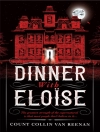Welcome to the captivating world of the 7 Best Short Stories series, where we bring you the most extraordinary works from remarkable authors.
In this edition, we delve into the enigmatic realm of the legendary American author, H.P. Lovecraft. Known for his unique brand of horror, Lovecraft shattered conventions, discarding ghosts and witches to unveil unspeakable terrors that lurk in the dark corners of a malevolent universe. Carefully curated by the esteemed critic August Nemo, this selection unveils Lovecraft’s mesmerizing narrative style and takes you on a chilling journey into the depths of his visionary imagination.
Prepare to be enthralled by the timeless mastery of H.P. Lovecraft and discover why his haunting tales continue to captivate and inspire generations of readers and creators alike. Get ready for an extraordinary literary experience that will leave you breathless and questioning the very fabric of reality.
Works selected for this book:
– The Call of Cthulhu;
– The Outsider;
– Pickman’s Model;
– The Statement of Randolph Carter;
– The Colour out of Space;
– The Dunwich Horror;
– The Music of Erich Zann.
– Bonus content: Notes on Writing Weird Fiction.
If you appreciate good literature, be sure to check out the other Tacet Books titles!
เกี่ยวกับผู้แต่ง
Howard Phillips Lovecraft (August 20, 1890 – March 15, 1937) was an American writer who achieved posthumous fame through his influential works of horror fiction. He was virtually unknown and published only in pulp magazines before he died in poverty, but he is now regarded as one of the most significant 20th-century authors in his genre.
Lovecraft was born in Providence, Rhode Island, where he spent most of his life. Among his most celebrated tales are The Rats in the Walls, The Call of Cthulhu, At the Mountains of Madness, The Shadow over Innsmouth, and The Shadow Out of Time, all canonical to the Cthulhu Mythos.
Lovecraft was never able to support himself from earnings as an author and editor. He saw commercial success increasingly elude him in this latter period, partly because he lacked the confidence and drive to promote himself. He subsisted in progressively strained circumstances in his last years; an inheritance was completely spent by the time he died, at age 46.












